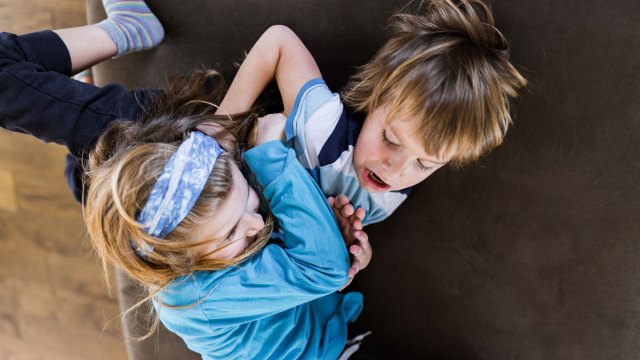A mom and therapist explains after-school restraint collapse, a phenomenon you’ve probably experienced on a regular basis
Have you ever had that parent-teacher conference where your kid’s teacher insists they’re a perfect angel in the classroom and you think, Are you sure you’ve got the right kid? Because when 3 p.m. rolls around and they get home, they start bouncing off the walls, bickering with each other, talking back to you, and generally acting like they’re completely uncivilized. It turns out, you’re not alone—and there’s even a name for this phenomenon: after-school restraint collapse. It’s a completely common thing, and once you learn more, you’ll totally get it.
Lindsay Adams, a child therapist and mom on TikTok, explains it as what happens to some kids after they “hold in” their emotions all day at school (those of us on the neurodivergent spectrum might know this as “masking”). Once they get home, they’re out of the energy required to hold in those feelings, so out they come. Kids, who are still learning how to be social and interact with one another and their teachers, often have a hard time doing that all day while also absorbing all the lessons they have to learn.
@mindfulasamother It’s back to school! #restraintcollapse #parentingtips #responsiveparenting
♬ original sound – Mindful as a Mother
When you think about it, restraint collapse is actually kind of a positive thing. It means that home is your kid’s safe space, where they feel comfortable enough to let all those emotions go and be themselves, even when that means being grumpy or tired.
Luckily, there are things you can do to help your kids manage after-school restraint collapse.
“Plan for the transition,” Adams recommends. “Know what they struggle with at that time of day and set them up for success. Structure their day in a way that allows them to do a calming or coping activity right when they get home or do a physical activity right when they get home.”
Kids that are more emotional, tired, or withdrawn may need more downtime and purposeful space, whereas high-energy kids would benefit from more physical movement.
“It could even be just going outside and hanging out outside, doing chalk, doing something creative. Really the things you wanna focus on are creativity, sensory stuff, and physical activity.”
She also says it’s important to “be patient with them for the first few weeks [of school] while they’re adjusting because it’s always going to happen—but it’s probably going to be more intense during transition periods where they’re getting used to going to school.”
With back-to-school season in full swing, this is a good reminder for parents. Be a little more forgiving—transitions are hard for everyone, even kids.











